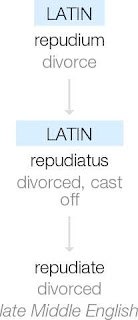WORD: REPUDIATE [repudiate]
PART OF SPEECH: transitive Verb
- 3rd person present: repudiates;
- past tense: repudiated;
- past participle: repudiated;
- gerund or present participle: repudiating.
PRONUNCIATION: /rɪˈpjuːdieɪt/ (ri-ˈpyü-dē-ˌāt)
SYLLABLES: (4) re·pu·di·ate
MEANING:
- To reject the truth or validity of; to deny.
- To refuse to have anything to do with; to disown.
To refuse to acknowledge or pay or honor (a debt).
- (In the past or in non-Christian religions) To divorce or separate formally from (a woman)
- To refuse to accept; especially : to reject as unauthorized or as having no binding force
SENTENCE EXAMPLES:
- the minister repudiated allegations of human rights abuses.
- Socialism had been repudiated at the polls.
- (law) Borrowers have begun repudiating their debt obligations.
- (law) The buyer is entitled to repudiate the contract within a reasonable period of time
- Mark 10:2
"And some Pharisees came up, and, in order to test Him and try to find a weakness in Him, asked, Is it lawful for a man to dismiss and *repudiate* and divorce his wife?"
- Philip was excommunicated in 1095 because he had repudiated his wife’.
- a generation that has repudiated the values of the past.
- She has publicly repudiated the government's policies.
- He published an article that repudiates the study's claims.
ORIGIN:
Late Middle English (originally an adjective in the sense ‘divorced’):
Latin repudiatus, past participle of repudiare, from repudium rejection of a prospective spouse, divorce, probably from re- + pudēre to shame.
FIRST KNOWN USE: 1545
SYNONYMS: deny, contradict, gainsay, disavow, forswear, disaffirm, disallow, disavow, disclaim, disconfirm, disown, negate, negative, refute, reject.
ANTONYMS: acknowledge, admit, allow, avow, concede, confirm, own.
REFERENCES:
At NADIGIGS, we aim at bringing out the best version of every child we reach out to.

















